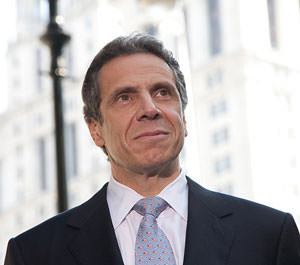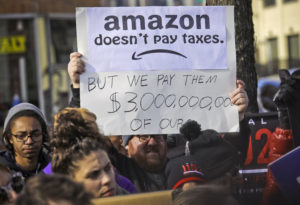Will Popular Reformer Cuomo’s Plan Tax the 1 Percent?
Held aloft by the highest approval ratings of any governor in America, Andrew Cuomo now plans a sweeping tax reform that is expected to demand more, not less, from New York's wealthiest.
Held aloft by the highest approval ratings of any governor in America, Andrew Cuomo scarcely seemed to worry about angering his state’s progressives, who were disappointed by his refusal to extend a state surtax on New York’s millionaires. But in what may come to be regarded as a watershed moment in his tenure, Cuomo now plans a sweeping tax reform that is expected to demand more, not less, from the state’s wealthiest, while reducing the burden on the middle class — in the name of “fundamental fairness.”
Over the weekend, rumors of a shift in Cuomo’s anti-tax position began to circulate, confirmed on Monday morning when his office dispatched a short essay by the governor to newspaper editors around the state arguing that New York’s current tax code is “unfair” to the middle class and inhibits economic growth.
Rather than the expiring surcharges, which Cuomo castigates for raising the taxes of families making $200,000 a year — “hardly millionaires,” as he put it — his proposed new system would add higher brackets at the top end and lower brackets in the middle. Although he didn’t offer details yet, his aims are clear enough:
“First, we need to reform the code in a way that creates jobs and grows our economy. To do that, we need to put more money in New Yorkers’ pockets and inject it back in to the economy. There are also tax credits that can incentivize private-sector job growth.
“Second, true reform for fairness has two factors: income brackets that fairly group income levels and progressive rates increasing with income. Simply put, to me ‘fairness’ dictates that the more you make the more you pay, and the higher your income the higher your rate. Also, you should be treated the same as people with similar incomes and differently from people who make significantly more, or significantly less, than you earn.”
Fairly or not, Cuomo’s decision to seek higher levies on the state’s highest earners will be portrayed as a turnabout from his earlier position, which had cast him as a defender of Wall Street and big business against labor populism. Predictably enough, Republicans and the local tea party were swift to attack. Mike Long, chairman of the state’s Conservative Party (and longtime antagonist of Cuomo and his father, the former governor), denounced him as a flip-flopper.
“He’s the one who made a principled stand,” said Long. “Whether you agree with that principled stand or not, once you break a principled stand, then one wonders what you can count on him for in the future.” The state’s tea party leaders said that Cuomo should be cutting more spending instead of raising taxes.
But Cuomo crushed the tea party-sponsored opposition to his campaign in last year’s election, against the midterm right-wing tide — and his opinion that the rich should be taxed more is at least as popular as Cuomo himself. If he succeeds in changing the tax system to encourage both higher employment and greater equity, he will have removed a potential obstacle to any future national ambitions he may cherish.
Joe Conason is the editor in chief of NationalMemo.com.
© 2011 CREATORS.COM
Your support matters…Independent journalism is under threat and overshadowed by heavily funded mainstream media.
You can help level the playing field. Become a member.
Your tax-deductible contribution keeps us digging beneath the headlines to give you thought-provoking, investigative reporting and analysis that unearths what's really happening- without compromise.
Give today to support our courageous, independent journalists.




You need to be a supporter to comment.
There are currently no responses to this article.
Be the first to respond.